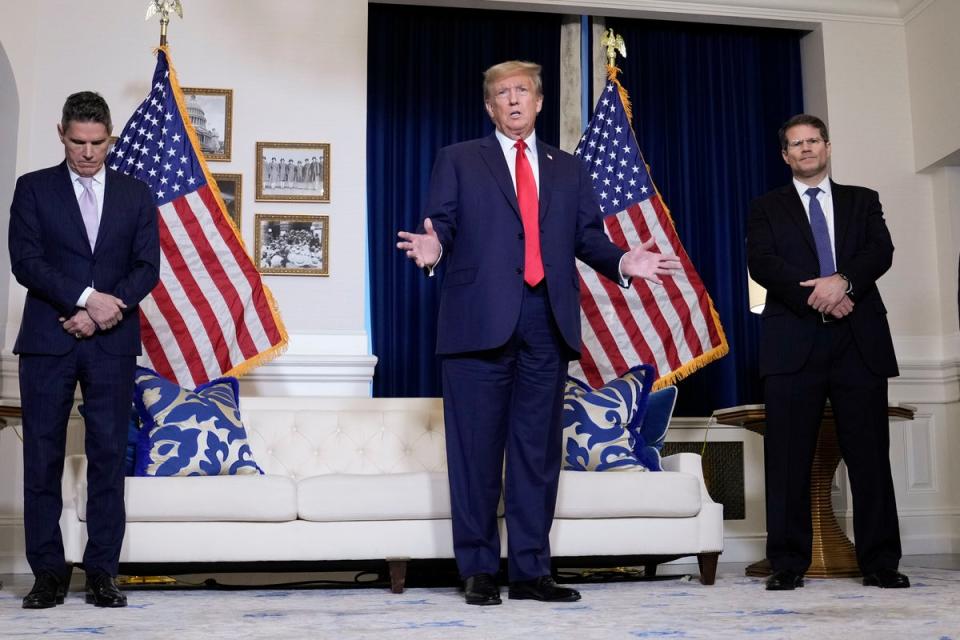A Colorado Republican is suing to kick Trump off the ballot. She says she’s worried for democracy’s survival

- Oops!Something went wrong.Please try again later.
There are two names in the title of one of the most consequential cases in front of the US Supreme Court in modern American history. One is Donald Trump. The other is Norma Anderson.
Ms Anderson, 91, is a retired Republican state lawmaker who broke ground as the first woman to serve as a majority leader in Colorado’s legislature. She’s now the unlikely face of a Supreme Court case that could have a seismic impact on the 2024 presidential election.
That case, Trump v Anderson, will be heard by the Supreme Court on February 8. It follows a mammoth ruling from Colorado Supreme Court justices that found the former president ineligible for the presidency under the scope of the 14th Amendment, which bars anyone who has sworn an oath to uphold the Constitution and “engaged in insurrection or rebellion” from holding public office.
The Colorado court’s ruling, which the former president appealed to the nation’s highest court, would prevent his name from appearing on the state’s ballots. Similar challenges were filed in more than a dozen other states.
Like millions of Americans, Ms Anderson was staring at a television screen in disbelief on January 6, 2021, when a mob fuelled by then-President Trump’s baseless election fraud claims breached the US Capitol.
“We don’t overturn elections in the United States,” she tells The Independent. “I mean, my goodness. Unbelievable. ... He urged the mob in this speech. There’s no doubt about it. ... We have a democracy and we depend upon the vote of the people to elect our officials, and you don’t change it by force.”
His threats and pressure campaigns against lawmakers, election officials and his vice president; his failure to stop rioters from breaking into the halls of Congress; and his persistent lie that the election was “stolen” or “rigged” against him present a grave threat to American democracy, she says.
“And when you go against the Constitution and create an insurrection on the Capitol to overturn an election, that is not democracy,” she tells The Independent. “As Ben Franklin said: We are a republic, if you can keep it. And boy, I think about those words right now.”
Ms Anderson, speaking from her home in Lakewood, Colorado, has watched Trump consume the Republican Party and, she believes, turn it into a group that values fealty to the former president above all else. She briefly left the GOP in 2018. At the time, she summed up her reason for doing so: “The Republicans nominated an oversexed playboy who has spent his entire career lying to people.”
“I don’t remember everything I’ve said about him,” she says now, laughing, “but that’s what it was.”
The former president is a “bigot” who “lives by the motto that if you tell a lie often enough people believe it,” she says. “Well, that’s what’s happened with the Republicans.”
Among the 91 criminal charges facing Trump are state and federal indictments concerning his efforts to overturn the 2020 election results, culminating in the mob he failed to stop. He has given no indication that he would do anything differently should he lose his party’s nomination or the general election in November.
“That’s what worries me so much,” Ms Anderson says. “I’m worried, very simple. I’m very worried.”

Ms Anderson was the first woman in Colorado to serve as the majority leader in the both the state’s House and Senate. She won her first election to Colorado’s House in 1986, four years after she lost her first campaign for a seat in the state legislature, and she served in the Colorado Senate from 1999 until 2006.
“I mean, at this point, I’m older than both of them,” she says of Trump and President Joe Biden. “I’ve been through a lot of presidents. … What has worried me – and it’s been going on before Trump, but Trump has made it worse – is the division in the country, the hatred.”
The 14th Amendment was among a suite of civil rights amendments enacted in the volatile aftermath of the US Civil War. It was intended to grant equal protection under the law to all citizens, including formerly enslaved people, with a broadly written clause aimed at preventing Confederates from returning to a government they were in rebellion against.
A September lawsuit filed by Citizens for Responsibility and Ethics in Washington on behalf of a group of five Republican and independent voters in Colorado – including Ms Anderson – argued that Trump failed that test, rendering him “constitutionally ineligible to appear on any Colorado ballot as a candidate for federal or state office”.
Following a trial and argument from both parties in state court, Colorado District Judge Sarah Wallace determined that Trump not only “engaged” with insurrection, he also “acted with the specific intent to incite political violence and direct it at the Capitol with the purpose of disrupting the electoral certification”.
Judge Wallace’s decision, however, did not knock Trump off the ballot, and plaintiffs appealed to the state’s Supreme Court.
In December, Colorado justices wrote in a 4-3 majority opinion that Trump “did not merely incite the insurrection.”
“Even when the siege on the Capitol was fully underway, he continued to support it,” they continued. “These actions constituted overt, voluntary, and direct participation in the insurrection.”
Trump appealed that decision to the Supreme Court, which agreed to hear the case on February 8.

A ruling from the high court would likely apply to all 50 states. But a ruling that would let Colorado’s decision stand, without applying more broadly to all ballots in every state, could allow states to continue drafting their own election rules. Similar challenges would then inevitably play out.
The 14th Amendment’s “insurrection clause” was mostly used for only a brief period following its ratification and the enactment of the Amnesty Act in 1872, according to a report from the Congressional Research Service. But Trump v Anderson is not entirely without recent precedent. Republican US Rep. Marjorie Taylor Greene faced a legal challenge over her eligibility for office under Section 3. So did former Republican US Rep. Madison Cawthorn, whose case was declared moot after he lost a primary election.
Last year, Couy Griffin, a county commissioner in New Mexico who was convicted for his role in the January 6 attack, was permanently removed from office under a Section 3 “insurrection” challenge, marking the first successful attempt to disqualify a public official from holding office in more than 100 years.
Lawyers for the former president have repeatedly argued that his actions on January 6 aren’t “insurrection”, and even if they were, Section 3 doesn’t cover the office of the presidency. Only congressional action could determine his eligibility, they claim.
Dozens of constitutional scholars, authoritarianism and democracy experts, retired judges, Capitol Police officers and civil rights groups have filed briefs to the Supreme Court to establish a bulk of the historical foundation for the case, one that Ms Anderson sees as a straightforward reading of a single sentence in the Constitution.
Trump’s actions in the wake of his election loss in November 2020 are “alarmingly similar to activities that have destroyed democracies in other countries,” according to a brief from Rachel Kleinfeld, senior fellow at the Carnegie Endowment for International Peace, and Yale University’s Tim Snyder.
“The violence of January 6 did not shock President Trump into altering his behavior to avoid rousing his followers to violence,” they wrote. “Instead, his continuing messages to supporters evoke a technique researchers call stochastic terrorism … when a figure with a large following publicly demonizes a target, knowing that it is impossible to predict who among the followers will act violently, but almost a certain probability that someone will aim for the desired mark.”
Meanwhile, Ms Anderson has faced harassment and abuse from Trump’s supporters. Those supporters include her state’s own Republican Party, which labeled the Colorado trailblazer and other plaintiffs “Never-Trumpers, RINOs, and Democrats” who are “colluding” to stop Trump from getting on the ballot.
“The Republican Party itself thinks it’s terrible. But that’s not the Republican Party that I was raised in and have represented my whole life,” she tells The Independent. “When you just bow to one man? That’s not what democracy is about. … Our forefathers are probably rolling over in their graves.”
But if the Supreme Court rules against Ms Anderson and other Colorado voters, “I just have to accept it,” she says.

